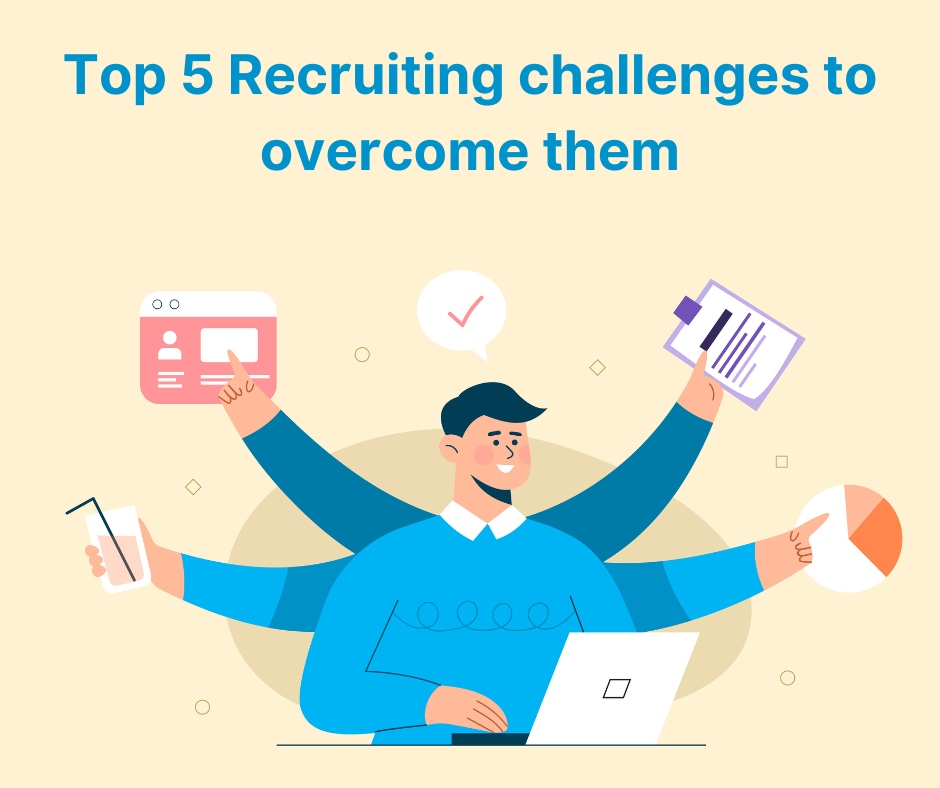Recruiting in today’s world is a challenging task. Recruiting is a process that requires time, effort, and patience. Having the right candidate for the right job is the most valuable asset to an organization. However, the main challenge for a start-up or a well-established enterprise is to attract top-talented and qualified people to their team. Hiring and retaining suitable candidates are the two most significant factors that set apart a great company from an average one. Here are some challenges and solutions directly on the right track to discovering and hiring talent as unemployment rates rise globally. Some of the typical recruiting challenges and the solutions to overcome them.
What are the challenges of recruiting?
1. Hiring the Right candidate:
Recruiting is a dynamic and multidimensional process that requires coherence structure and continuous optimization. Therefore, several challenges arise at every step of the recruitment process. Another pressing challenge is to ensure that recruiting and respective professional hires also bring an excellent return to the company. A core team of quality employees empowers the organization to stand apart, establish a brand, and create a unique experience. The organization must develop a good recruitment plan to expedite searching, interviewing, and the hiring the right personnel for the job.
How to overcome this recruitment challenge?
Be specific about the qualifications in the job postings and provide a brief overview of the function. Hence, the employer must select a defined and established structure for a branding strategy to offer potential candidates. It can be tackled by hiring employees by creating a responsive career page to display the employer brand and check the employee reviews and feedback, so necessary adjustments can be made to get the attention of the best talent. Right fit for the right job can be allocated firmly through outsourcing companies.
2. Quick hiring; Need to Hire Fast:
Recruiting teams aim to reach employees soon as possible since unfilled positions cost money and cause delayed operations. A slow recruiting process usually leads to a loss of productivity and revenues, as the job description usually stays longer. Manual and tedious tasks result in a slow hiring process, which eventually leads to candidates staying in their career process. The main reason is narrowly defined needs, inefficient interviewing, and a need for more decision-making skills.
How to fix it?
Evaluate each step of the recruitment process, and streamline and refine it as much as possible.
An excellent way to speed up hiring is to standardize interview guidelines, streamline processes, boost recruiter productivity or outsource to a third-party vendor for an efficient recruitment process.
3. Building a Diverse Organization:
There are many benefits of diversity within an organization. These include new perspectives, greater insight, and the development of a meritocratic approach that helps to improve leadership and team performance. However, attracting and engaging a more diverse set of applicants can be a challenging task.
How to fix it?
When an organization needs to be diversified, it should consist of the following:
- Ensuring the job posts are gender-neutral
- Use specialist staffing agencies (market knowledge and have deep pools of candidates to contact)
- Manage the candidate’s expectations
4. Diversify the recruiting strategies:
Diversifying the recruiting strategies also provide many tangible benefits for performance, innovation, and productivity. Some of the known perks include:
- A broader range of skills and experience in the team;
- Increased language
- More extensive and more varied candidate pools;
How to fix it?
- It’s good to advertise a job on the board, which brings good candidates.
- Using social media to post the jobs to promote the company
- Showcasing the culture, benefits, and employee stories on the careers site to encourage more applicants.
- Attending job fairs and hosting recruiting events.
These are the advisable measures will be enlisted out of the recruiting company to the recruiters.
5. Data-driven recruitment:
Companies utilize recruitment data and metrics to enhance the recruiting process and make better judgments continuously. However, gathering and analysing data may take time and effort. Predictive recruitment analytics helps to reduce cost per hire and find talent faster. Improve the quality of the candidate database and get a head start on filling more open roles with recruitment data analytics.
How to overcome this challenge?
It is inevitable for recruiters to leverage analytics so they can take corrective action on time and improve the entire recruitment process. Recruiters track recruitment performance at every stage, making it easier for employers to enhance their existing processes, offer a positive candidate experience, and make better hiring decisions. While implementing a data-driven recruitment process can get a deluge of benefits to the organization. Apparently, the deciding factor like time consumption, cost reduction can be reduced by recruiting service providers.
Wrap-up:
Talentpro makes a redefined and streamlined recruitment process in enhancing the recruiting team, providing support and expertise as required for the recruitment workflow.









